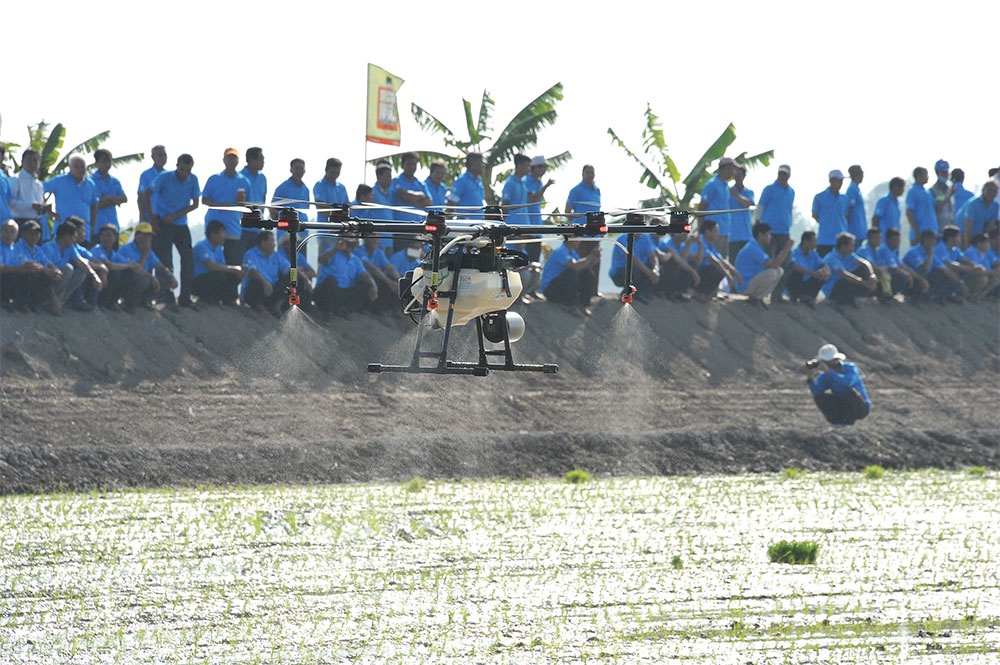Green tech the catalyst for growth
 |
| More advanced technology in agriculture could help push Vietnam’s growth to the next level, photo Le Toan |
With the two industries of wind and solar power said to contribute to Vietnam’s GDP by up to $70-80 billion, and other areas like hydrogen set to offer up other big sums, government and businesses are leaning into Vietnam’s green growth prospects.
At last week’s conference on green growth in Vietnam and the roadmap for success, held by the Ministry of Planning and Investment (MPI), Minister Nguyen Chi Dung said that the green economy is opening up opportunities for investors in new fields such as renewable energy, smart transport, smart agriculture, green buildings, and green urban finance.
Jaime Ruiz-Cabrero, head of Boston Consulting Group (BCG) Southeast Asia, added that Vietnam could become one of the leading countries in developing clean and new technologies if issuing suitable policies and developing infrastructure.
“Speed is the decisive factor in the success of green energy development,” said Ruiz-Cabrero.
SK Group experts found that green growth could save $178 billion in the costs of climate change, which impacts productivity, health, and environmental issues.
Daejung Kim, vice chairman at SK’s Green Investment Center, said that to overcome climate change challenges and proceed with green growth, developing clean hydrogen; carbon capture, utilisation, and storage; sustainable agriculture; and green entrepreneurship are all valuable.
“Of these, renewable energy, including hydrogen and biomass, will be further utilised in power generation, especially in difficult areas,” Kim explained.
He said that SK has been pouring a lot into the energy transition over the last three years to manufacture semiconductor equipment and circuit boards, batteries, and electrolysis solutions for hydrogen, and new-generation sodium reactors. “These solutions are being researched and deployed widely, especially in the Asian and Vietnamese markets,” said Kim.
Kim explained that Vietnam needed 25-40 million tonnes of hydrogen every year to reach the goal of net-zero by 2050, as it can be produced from diverse resources with the potential for near-zero emissions.
“Developing green hydrogen in Vietnam will positively affect both the environment and the economy to cut 280 million tonnes of emissions, contributing $45-50 billion to the country’s GDP, and create 30,000-45,000 jobs,” he said.
Preferential relationships
Previously, the Vietnam Energy Institute and the United Nations Development Programme (UNDP) estimated that Vietnam could produce at least 11.49 million tonnes of green hydrogen by 2030, and up to 18.78 million tonnes by 2050 provided by decentralised solar and wind. Moreover, the cost of hydrogen production is forecast to decrease, due to the sharp decline in the cost of key input technologies such as storage batteries.
Patrick Haverman, UNDP deputy resident representative, said that green hydrogen was useful in combating climate change because it can replace fossil fuels in applications where decarbonisation is complex, such as maritime and aviation transportation or industrial processes. Furthermore, it could be effective in terms of long-term energy storage.
“Vietnam has an advantage in producing green hydrogen based on great renewable energy, preferential trade relationships, stable politics, and proximity to major exporters in Asia-Pacific,” said Haverman.
In addition to developing green hydrogen, carbonisation is a promising way to reach green growth and net-zero by 2050. SK Group targets reducing 200 million tonnes of carbon by 2030, about 1 per cent of the global carbon reduction target for 2030.
“We will enter the carbon-free power generation business by participating in small modular reactor projects, and develop the blue-green hydrogen business and the eco-friendly solid carbon business,” said Kim of SK.
Nguyen Anh Duc, general director at the Vietnam Petroleum Institute, said carbon management would create new business opportunities related to carbon trade and exchanges. In India and Indonesia, for example, carbon capture makes up 30 per cent of all decarbonisation.
“However, in Vietnam, only a minimal percentage of emitted carbon is captured at 0.12 per cent. So, we need to do a lot to collect carbon in addition to energy and emissions transition,” Duc said.
“The capacity for collecting carbon in Vietnam is good at about 70,000 tonnes, which would reduce 200 million tonnes of emissions per year for the next 100 years, including 39 billion tonnes from under the Red River, and 10 billion tonnes from pools under the Mekong river.”
Carbon collected from factories could be moved in the available pipelines of petroleum groups, according to Duc.
Greener consumption
For the National Strategy on Green Growth to reach its goals, Vietnam needs drastic breakthroughs to develop the green economy, contributing $300 billion to the country’s GDP by 2050, from $6.7 billion in 2020.
More and more countries are joining the “green alliance,” transiting to a green economy through regional and global commitments. For example, the European Union with the Green Agreement 2030 focuses on reducing carbon emissions, accelerating the use of renewable energy, and green transport, and promoting environmentally friendly products. Other governments and businesses around the world, such as Japan, South Korea, and the United States, are also investing in green development.
According to a recent assessment by the European Commission, the global market size for green products and services is estimated at over $5 trillion, with a much higher growth rate than traditional markets. By 2030, the green economy will create about 24 million new jobs globally. In the US, the green economy creates jobs for about 9.5 million workers, contributing equivalent to $1.3 trillion per year.
Greening is also a trend in China – the economy with the highest emissions in the world today – with a strong focus on using green transport. It has focused on applying green growth policy, regulatory standards for energy-saving goods, and supporting high-tech and green technology projects.
In China, manufacturing wind power turbines and solar panels is generating huge value, estimated at $62 billion and 659,000 new jobs by 2025.
In Malaysia, one in three of the foreign direct investment inflows in the 2016-2021 period was related to the green economy. Despite difficulties and uncertainties around the world, the income of jobs in green technologies is 31 per cent higher than the average for other jobs.
To reach set targets, the MPI and BCG estimated that the total investment required by Vietnam to become a carbon-neutral economy is $900 billion. It must also build appropriate policies to mobilise green capital effectively.
“The government should provide a stable policy framework, allowing foreign enterprises to invest easily, and reducing investment costs. In addition, an effective green classification system is also needed, including clear and detailed criteria and classification for green industry by country,” said Ruiz-Cabrero from BCG. “With attractive policies, the contribution of green technologies to GDP can rise by 10 per cent.”
“Countries proactively moving towards a low-carbon economy are mitigating the risks caused by climate change as well as gaining economic benefits in the future.”
Ruiz-Cabrero also provided recommendations to the Vietnamese government, including completing planning and strategies with integrated green growth goals; strengthening the construction of a stable green financial system to reduce investment costs; developing the grid infrastructure system; and accelerating the development of the clean hydrogen ecosystem.
 | Norwegian companies bring green tech solutions to Vietnam Nearly a dozen Norwegian companies are presenting their expertise and tech solutions to help promote a sustainable green economy in Vietnam. |
 | Accelerating trade with innovation and green tech Vietnam and the Netherlands will celebrate 50 years of diplomatic relations in 2023. Kees van Baar, Dutch Ambassador to Vietnam, writes about the prospects in the cooperation between both nations, especially in terms of trade and investment, and both nations’ cooperation in green economy development. |
What the stars mean:
★ Poor ★ ★ Promising ★★★ Good ★★★★ Very good ★★★★★ Exceptional
Related Contents
Latest News
More News
- Haiphong gains new growth impetus from strategic planning and integrated infrastructure (February 27, 2026 | 16:40)
- Kurz Vietnam expands Gia Lai factory (February 27, 2026 | 16:37)
- SK Innovation-led consortium wins $2.3 billion LNG project in Nghe An (February 25, 2026 | 07:56)
- THACO opens $70 million manufacturing complex in Danang (February 25, 2026 | 07:54)
- Phu Quoc International Airport expansion approved to meet rising demand (February 24, 2026 | 10:00)
- Bac Giang International Logistics Centre faces land clearance barrier (February 24, 2026 | 08:00)
- Bright prospects abound in European investment (February 19, 2026 | 20:27)
- Internal strengths attest to commitment to progress (February 19, 2026 | 20:13)
- Vietnam, New Zealand seek level-up in ties (February 19, 2026 | 18:06)
- Untapped potential in relations with Indonesia (February 19, 2026 | 17:56)

 Tag:
Tag:




















 Mobile Version
Mobile Version